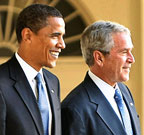 |
Politico...
Whose terrorism
policies get credit: George W. Bush or Barack Obama?
By Josh Gerstein & Glenn Thrush
George W. Bush coined the term “war on terror” in 2001, but President
Barack Obama — who pointedly avoids using that term — scored what is
undeniably that war’s signal victory.
To mark the killing of Osama bin Laden, Obama on Thursday will visit
ground zero for the first time as commander in chief, nearly 10 years
after Bush grabbed a bullhorn and told shocked rescue workers in the
rubble of the World Trade Center: “I can hear you! … And the people —
and the people who knocked these buildings down — will hear all of us
soon!”
Bush, who cast the fight against bin Laden in millennial terms of good
and evil, never got his man. Obama, mocked by conservatives for his
commitment to soft power and rolling back Bush-era interrogation
practices, green-lighted a risky mission that resulted in the
elimination of the man who was responsible for the murders of more than
3,000 Americans.
“The terrorism issue hasn’t always been easy for Obama,” said Hank
Sheinkopf, a New York-based Democratic consultant. “The execution of
bin Laden gives him a lot more credibility at ground zero and on the
issue of terrorism in general. … Bush was the guy who started the
fight, but Obama finished it.”
Bush declined an invitation to join Obama in New York, but the
president will walk in his predecessor’s footsteps — and not
comfortably. For bin Laden’s capture has only highlighted the argument
of many former Bush administration officials that Obama has continued
more of their policies than he cares to admit.
To be sure, Obama has come under withering criticism from conservatives
such as former Vice President Dick Cheney for what they consider a lack
of toughness in pursuing the nation’s enemies. At the same time, many
Bush-era anti-terror warriors have argued that the differences are
overstated — and Obama hasn’t radically diverged from Bush’s
operational approach to finding, capturing and killing America’s
enemies.
“Barack Obama embraced the bulk of the Bush counterterrorism policies
as they stood in January 2009,” said Jack Goldsmith, a Harvard Law
School professor who served as a senior Justice Department official
under Bush. “But the Bush counterterrorism policies as they stood in
2009 were quite different than the ones early in the Bush
administration, the result of years of pushback, alteration and
tweaking by courts, Congress, the press, civil society and many actors
inside the Bush administration.”
Goldsmith, who’s writing a book on how both presidents’ terror policies
evolved, says there are parallels between Bush’s retreat from tactics
like waterboarding and Obama’s abandoned plans to bring detainees to
the U.S. for trial and detention.
“Ironically, many of the same political pressures that led Bush to dial
back his aggressive counterterrorism policies also led Obama to dial
back some of his counterterrorism policies, including closing Gitmo and
trying [Khalid Sheikh Mohammed] in civilian court,” the Harvard
professor said. “The two very different presidents ended up in about
the same place because of the larger structural pressures at work on
the post-9/11 presidency.”
Read the rest of the story, with links, at Politico
|

